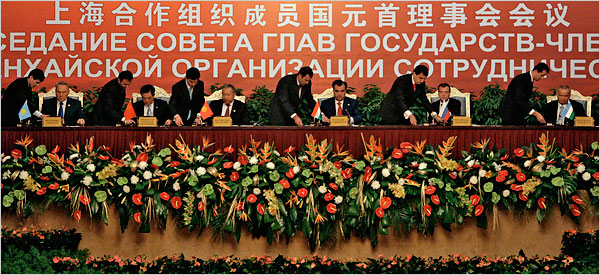 Continuing yesterday's discussion of the SCO's joint declaration being very neutral when it came to defending Russia's future and past actions in Georgia; What does this mean for Russia? What does this say about China? And What does it show about the four Central Asian states in the group and their position in the world? As I kept thinking about this ‘declaration’ and its timidity toward anything that would help Russia's world stance on the Georgian issue, the more I saw it as a great blow to their strategic and diplomatic standing. Here was an autocratic friend, one with tremendously rising world power, who had backed Russia on US influence in CA, East European missile defense, the expansion of NATO, among other items, telling Russia to 'solve existing problems peacefully, through dialogue, and to make efforts facilitating reconciliation and talks.’ China, it appears, was not going to join this fight. As was mentioned yesterday, China has their own separatists to worry about and do not desire confrontation with the West as they fear losing the economic engines that keep their nation humming. But China's stance goes back further, to Deng Xiaoping's ‘peaceful’ or ‘quiet’ rise. The discipline of the Chinese Communist Party to not get entangled in foreign affairs is amazingly consistent and has shown to be in most cases good policy (However it is not the policy and action of a true world power).
Continuing yesterday's discussion of the SCO's joint declaration being very neutral when it came to defending Russia's future and past actions in Georgia; What does this mean for Russia? What does this say about China? And What does it show about the four Central Asian states in the group and their position in the world? As I kept thinking about this ‘declaration’ and its timidity toward anything that would help Russia's world stance on the Georgian issue, the more I saw it as a great blow to their strategic and diplomatic standing. Here was an autocratic friend, one with tremendously rising world power, who had backed Russia on US influence in CA, East European missile defense, the expansion of NATO, among other items, telling Russia to 'solve existing problems peacefully, through dialogue, and to make efforts facilitating reconciliation and talks.’ China, it appears, was not going to join this fight. As was mentioned yesterday, China has their own separatists to worry about and do not desire confrontation with the West as they fear losing the economic engines that keep their nation humming. But China's stance goes back further, to Deng Xiaoping's ‘peaceful’ or ‘quiet’ rise. The discipline of the Chinese Communist Party to not get entangled in foreign affairs is amazingly consistent and has shown to be in most cases good policy (However it is not the policy and action of a true world power).
So Russia lost out on China's support, while surely they can garner the backing of their former satiellites and energy partners, Kazakhstan, Kyrgyzstan, Uzbekistan, and Tajikistan? But these four joined China in the neutral joint declaration, all failed to mention the Georgia conflict in their open statements, and ignoring Medvedev's request, none of them have recognised S. Ossetia or Abkhazia. Here is a quote from Nikolay Petrrov, an expert in Russian politics with the Carnegie Moscow Center;
"It would have been very important to have gotten direct support from these states, which very closely work and depend on Russia, but Moscow didn't get any support aside from general statements," said Nikolay Petrov. He added that the Central Asian states' refusal to overtly back Moscow was an indication of the "limits of Russia's influence."
China no doubt gave these states cover to disobey Moscow, but their interests in not alienating the US/West were also shown in this lack of action and defense of Russia. In today's geopolitics, the CA states have more avenues to turn to for support and customers to sell to than just Moscow and this SCO action proves it.
So this morning, I expected to see Western editorials discussing Russia's growing isolation in this conflict, but instead I found, once again, numerous pieces about a New World Order and the Return of the Cold War. But with the US remaining diplomatically strong, if in no other area, and the EU discussing sanctions, and the fact that only rogue regimes have voiced true support for Russian actions, one has to call into question the success of Georgian-Russia conflict for Moscow. I’m not trying to say that the move was not a strategic success in many fronts, it was and I have discussed this, but its long term effects and gains appear to be in question.
Just what did Russia get out of this? We know they got to hurt, but maybe not finish off, their Georgian rival. We know they have gained consternation and isolation from and in the world. We know that all former Soviet states have grown more fearful and may become a bit more pliant to Moscow. But we also know that Ukraine, Poland, and the CA states have other patrons and defenders in which to turn to. Poland signed a missile/defense deal with the US days after the conflict and Kyrgyzstan has a US air base right next to the one they host Russia in as well. China's power in the CA (as they have made yet another business deal), to Russia's chagrin, is strong and growing. The EU, though strategically and militarily weak, has shown some resolve in making matters difficult for Russia to move ahead after this conflict.
So can the West feel a little bit more secure in their 21st century liberal, globalized world order? Well Russia reminded us all that states do matter, military power does matter, strategic spheres do matter, but their growing isolation portrays a world that is no longer very comfortable with good old power politics, to Mr. Putin and Mr. Medvedev's chagrin.
(Photo Source: New York Times)